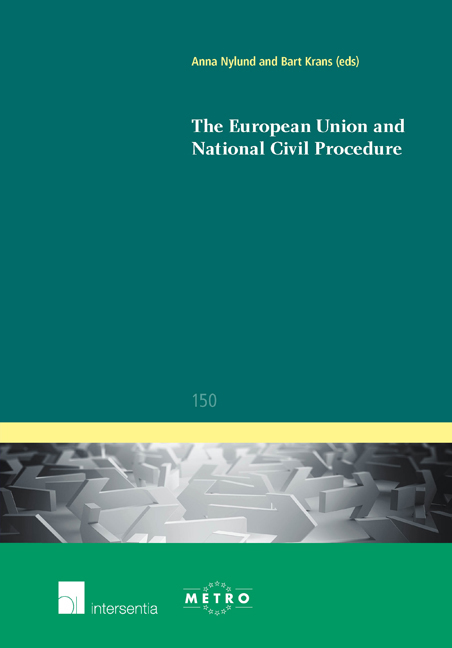Book contents
- Frontmatter
- Contents
- About the Authors
- List of Abbreviations
- The European Union and National Civil Procedure – A Rocky Road or a Smooth Process?
- Some European Challenges for Belgian Civil Procedure
- Danish Civil Procedure and the Internal Market: Impact and Challenges of Sectoral Harmonisation
- European Influences upon English Civil Justice: Tempests or Gentle Breezes?
- European Union and National Civil Procedure: The French Paradox
- The European Union and Civil Procedure from a German Perspective
- Interaction between European Law and Hungarian Civil Procedure Law
- The Impact of EU Law on Dutch Civil Procedure Law
- Norway: An Insider Outside – or an Outsider Inside – European Civil Justice
- Polish Civil Proceedings: How Much Europeanised?
- Slovenian Civil Procedure and the Transformative Power of the EU
- The Curious Incident of the Dog in the Night-Time: Europeanisation of Civil Procedure in Sweden
- Conclusions and Outlook
- Index
- Miscellaneous Endmatter
The European Union and National Civil Procedure – A Rocky Road or a Smooth Process?
Published online by Cambridge University Press: 19 December 2017
- Frontmatter
- Contents
- About the Authors
- List of Abbreviations
- The European Union and National Civil Procedure – A Rocky Road or a Smooth Process?
- Some European Challenges for Belgian Civil Procedure
- Danish Civil Procedure and the Internal Market: Impact and Challenges of Sectoral Harmonisation
- European Influences upon English Civil Justice: Tempests or Gentle Breezes?
- European Union and National Civil Procedure: The French Paradox
- The European Union and Civil Procedure from a German Perspective
- Interaction between European Law and Hungarian Civil Procedure Law
- The Impact of EU Law on Dutch Civil Procedure Law
- Norway: An Insider Outside – or an Outsider Inside – European Civil Justice
- Polish Civil Proceedings: How Much Europeanised?
- Slovenian Civil Procedure and the Transformative Power of the EU
- The Curious Incident of the Dog in the Night-Time: Europeanisation of Civil Procedure in Sweden
- Conclusions and Outlook
- Index
- Miscellaneous Endmatter
Summary
Europe is in a period of increasing Europeanisation of civil procedure. The European Union (EU) relies on national systems to apply and enforce EU law and it leaves procedural issues to the Member States. Therefore, many procedural elements of EU law are based on decentralised enforcement. According to the Rewe/Comet-doctrine, Member States have ‘procedural autonomy’ as long as the national civil procedure complies with the principles of equivalent and efficient enforcement. In the course of the years, the EU court has ruled many times on topics that can be referred to as some form of European procedural law.
The Amsterdam Treaty of 1997 gave the EU increased competencies in civil justice. Article 81 of the Treaty of the Functioning of the European Union (TFEU), which gives the EU the power to develop judicial cooperation in civil matters with cross-border implications, and article 114 on the adopting measures to establish and improve the functioning of the internal market, give EU competence to issue secondary law in the field of civil justice. Thus, EU has gained significantly more influence on national civil procedure for both cross-border and purely national cases. Further, the EU Fundamental Rights Charter, in particular article 47 giving a right to an effective remedy and to a fair trial, contributes to the expansion of powers within the field of civil justice.
According to Bart Krans, Europeanisation of civil procedure consists of three pillars. The first pillar consists of influences from the European Convention on Human Rights and the Charter of Fundamental Rights. The second pillar consists of the growing number of European secondary law concerning the crossroads of civil procedure law and private international law, especially cross-border proceedings and judicial cooperation, such as the Brussels I Regulation, the Regulation on European Enforcement Orders and the Small Claims Regulation. The third pillar can be characterised as ‘invisible’ as it consists of a number of issues that are not regulated in a coherent way. Partly it emanates from case law from the European Court limiting procedural autonomy to promote equivalent and efficient application of EU law. Partly it emanates from procedural rules in Directives. Many Directives of a mainly substantive nature include procedural (or quasi-procedural) rules that influence national civil procedure.
- Type
- Chapter
- Information
- The European Union and National Civil Procedure , pp. 1 - 4Publisher: IntersentiaPrint publication year: 2016



